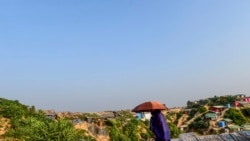Rohingya Broadcast Rohingya “Lifeline” radio - Tuesday, August 04, 2020 MC & News: Sami Ahmed, Hamid Hussain & Mohammed Hussain \\arsenic\netexchange$\Bangla\MP3 ROH Lifeline 08042020 1130 UTC Intro Today: Tuesday, August 04, 2020 7:30 a.m. (Washington, D.C., USA) News Headlines Duration: 6 minutes · U.S. election will be Nov. 3 as planned, Trump advisers say · Biden assails Trump for 'bald-faced lies' about voting by mail · There May Never Be a 'Silver Bullet' Against COVID-19, WHO Chief Says · It is forbidden to go out of the house in Bangladesh after ten o'clock at night without an urgent need · Rakhine State: Local eye witnesses accuse, police of shooting at two Rohingya in Sittwe Township Shortwave: 31-meter band, 9350 kHz; 25-meter band, 11700 kHz and 12030 kHz Medium wave (AM): 1575 kHz Report: VOA News Related item code: 9-P Duration: 5:10 minutes Translator: Mohammed Hussain Topic: Barakah: UAE starts up Arab world's first nuclear plant (with actuality) Sources: https://www.bbc.com/news/world-middle-east-53619916 Summary: The United Arab Emirates has launched operations at the Arab world's first nuclear power plant, on the Gulf coast just east of Qatar. Nuclear fission has begun in one of four reactors at the Barakah plant, which uses South Korean technology. The plant was due to open in 2017 but start-up was delayed for what officials said were safety requirements. The oil-rich UAE wants Barakah to meet a quarter of its energy needs, as it adopts more sustainable energy sources. Just two weeks ago the UAE sent a probe on a mission to Mars - another high-profile scientific expedition, the first for the Gulf nation. The UAE is also investing heavily in solar power - a plentiful energy source in the Gulf. Some energy experts question the logic of Barakah, arguing that solar power is cleaner, cheaper and makes more sense in a region plagued by political tensions and terrorism. Last year Qatar called the Barakah plant a "flagrant threat to regional peace and environment". Qatar is a bitter regional rival of the UAE and Saudi Arabia. Across the Gulf lies Iran, hostile to the UAE, and subject to US sanctions because of its controversial nuclear program. Dr Paul Dorfman, head of the international Nuclear Consulting Group, wrote last year that "the tense geopolitical environment in the Gulf makes nuclear a more controversial issue in this region than elsewhere, as new nuclear power provides the capability to develop and make nuclear weapons". The London-based scientist also highlighted the risk of radioactive pollution in the Gulf. In a statement the plant's developer the Emirates Nuclear Energy Corporation (ENEC) said it was committed to the "highest standards of safety and security" and that the plant would play an important role diversifying and decarbonizing the economy. "The Barakah plant will supply clean baseload electricity to the grid - complementing intermittent renewable sources of energy such as solar and wind, which are not able to generate electricity on a continuous basis," it said. It said, "It will provide up to 25% of the UAE's electricity needs once fully operational and will help prevent the release of 21 million tons of carbon emissions, equivalent to removing 3.2 millions cars off the road annually." Report: Sabera Begum (Cox’s Bazar) Related item code: 9-P Duration: 7:00 minutes Topic: With the learning centers closed in the camps many guardians are enterprising for coaching center education thinking of their children's future. Translation summary: Mr. Mohammed Amin (21) is living Camp # 18, Block # 19, Balukhali-2, Thaingkhali, Ukhia, Cox’s Bazar. He was a resident of Monikul, Buchidong, Myanmar. He came to Bangladesh in 2017 due to genocide by Myanmar government. Mr. Amin said the children of the camps have been spending idle time since the closure of the Learning Center and Madrasa. Amin said that in this lockdown
খন্ড
-
![]() জানুয়ারী ১৬, ২০২৬
জানুয়ারী ১৬, ২০২৬Rohingya Broadcast
-
![]() জানুয়ারী ১৫, ২০২৬
জানুয়ারী ১৫, ২০২৬Rohingya Broadcast
-
![]() জানুয়ারী ১৪, ২০২৬
জানুয়ারী ১৪, ২০২৬Rohingya Broadcast
-
![]() জানুয়ারী ১৩, ২০২৬
জানুয়ারী ১৩, ২০২৬Rohingya Broadcast
-
![]() জানুয়ারী ১২, ২০২৬
জানুয়ারী ১২, ২০২৬Rohingya Broadcast
-
![]() জানুয়ারী ০৯, ২০২৬
জানুয়ারী ০৯, ২০২৬Rohingya Broadcast







